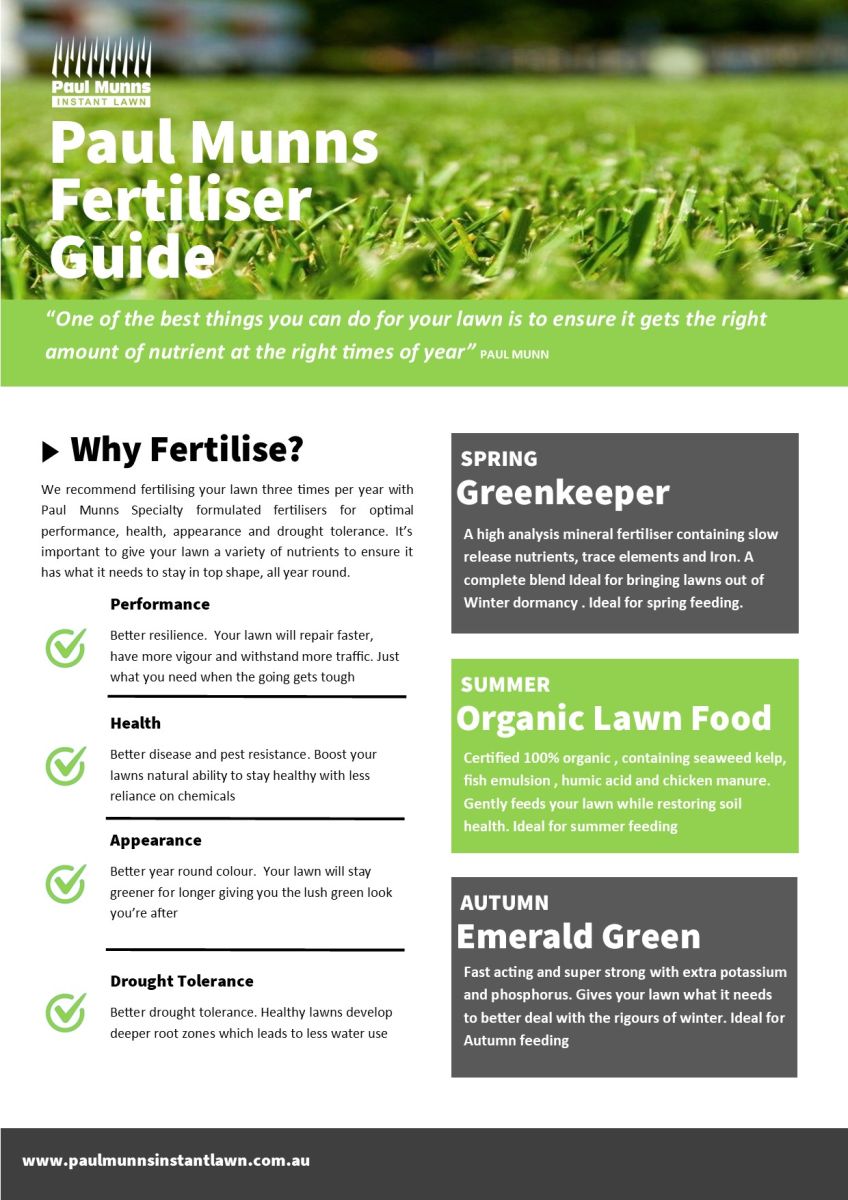Why use organic fertilisers on Lawns?
Author: Stefan Palm Date Posted: 27 November 2024
During Summer, we have always recommend using an organic fertiliser rather than a mineral fertiliser. Organic fertiliser are truly amazing in how they facilitate healthy lawns and healthy soils and should be a part of every fertiliser program.
When it comes to fertilising lawns, high on most people’s expectations is a fast, greening effect, and that’s something that mineral fertilisers do well, but there is a whole lot more to fertilising than simply greening up your lawn.
That’s where organic fertilisers come in. Let me tell you a little bit about Paul Munns Organic Lawn food so that you can get more of an idea of the benefits of incorporating organic fertilisers in your fertiliser program, especially during Summer when it is important not to over-feed your lawn. Just to explain, mineral fertilisers are man-made and are of a chemical origin. Organic fertiliser is, as the name suggests - naturally derived. Organic fertilisers won’t release as much nutrients as mineral fertilisers, and they won’t do it as quickly; however, there are a whole lot of things that they will do to facilitate a healthy and strong lawn.
Paul Munn Organic Lawn food is NAASA organic certified fertiliser and contains:
- Seaweed
- Humic acid
- Manure and fish
These ingredients are composted together to stabilise the nutrients and make them available over a sustained amount of time. Each of these components plays an important role – let me explain…
The benefits of seaweed:
Seaweed contains a number of naturally occurring growth stimulants – fantastic for promoting plant and root growth and development. Seaweed is also recognised for its ability to retain moisture in the soil and to help lawns resist the effects of frost and heat stress.
The benefits of humic acids:
Humic acids bind to and help plant roots receive water and nutrients. They actually transport nutrients from the soil into the lawn roots because they hold onto the nutrients in the soil, preventing it from leaching out. Because humic acids are attracted to the lawn roots, they bring with them water and nutrients that the lawn needs.
The benefits of Manure and fish:
Both manure and fish encourage the development of earthworm and microbial activity, leading to healthy, well-structured soils. They both increase soil fertility by providing essential nutrients such as nitrogen, potassium and phosphorous, all of which are released slowly to the lawn roots.
Paul Munns Organic Lawn Food is composted, steam-treated and ground into a crumb for easier and cleaner handling. These processes stabilise the nutrients, maximise nutrient availability and ensure the product is free of any parasites, pathogens and weed seeds. Most importantly, the resultant product retains the microbiology necessary to provide a ‘living’ fertiliser. The healthy bacteria in Paul Munns Organic Lawn Food play a significant role in nutrient availability and uptake. Interestingly, it will hold up to 70% of its own weight in water.
In a nutshell, certified organic fertilisers promote healthy lawns. When watered into the soil profile, they help soils hold more water, hold nutrients in the soil for longer, improve soil structure, improve resistance to heat stress and frost, increase resistance to pests and disease and foster healthy ecosystems by keeping them alive with microbiological diversity. They are 100% natural, contain no chemicals and have no burn potential on your lawn.
The benefits of organic fertilisers are realised over time as you continue to use them and should not be measured by how quickly they greened up your lawn. If you persist, you will reap the benefits of looking after the soil, which will result in a healthier lawn - good news for any lawn lovers! For more information on our recommended fertiliser program, click on the image in this blog.
Comments (1)
Lawn Fertiliser
By: Geoff of Athelstone on 1 December 2024Hi Stefan Thanks for the great reading articles. We have lawns comprising santa anna couch and (a majority of) kikuyu. It benefits from slashing (to dethatch) alternate years (in the 2nd week of September to avoid sunburn). I have found applying some gypsum and a light chemical/mineral fertiliser to promote quick greening, and also an organic fertiliser for longer term effect, seems to be a good compromise from using organic fertiliser only. The other years I have been applying organic fertiliser (and gypsum) only. Over a number of years the worm population has increased. Over the warmer months I water deeply, only once a week. Your thoughts ?
Paul Munns Instant Lawn Response
Hi Geoff, thanks for your query. Sounds like you have your lawn care routine worked out! You shouldn't see burning after scalping, even in summer, but September is still a good time to scalp as long as your lawn is no longer dormant. Rotating mineral and organic fertilisers is a great way to maintain a healthy lawn. Gypsum is typically used to break down clay soils, but can also be used to manage soil salinity if you find that to be an issue. It's always good to have a biodiverse soil with a healthy worm population! Regarding the watering, this is highly specific to your individual lawn and method of irrigation. Deep watering as you are doing is usually best for both couch and kikuyu. If you'd like to discuss further, please call us on 8298 0555. Kind regards, Lily.

